
Doctors Explain How Hiking Actually Changes Our Brains
While it may seem obvious that a good
hike through a forest or up a mountain can cleanse your mind, body, and
soul, science is now discovering that hiking can actually change your
brain… for the better!
Hiking In Nature Can Stop Negative, Obsessive Thoughts
Aside from the almost instant feeling of
calm and contentment that accompanies time outdoors, hiking in nature
can reduce rumination. Many of us often find ourselves consumed
by negative thoughts, which takes us out of the enjoyment of the moment
at best and leads us down a path to depression and anxiety at worst. But
a recent study published in Proceedings of the National Academy of Sciences found that spending time in nature decreases these obsessive, negative thoughts by a significant margin.
To conduct this study, researchers
compared the reported rumination of participants who hiked through
either an urban or a natural environment. They found those who walked
for 90 minutes in a natural environment reported lower levels of
rumination and they also had reduced neural activity in the subgenual
prefrontal cortex, an area of the brain related to mental illness. Those
who walked through the urban environment, however, did not report
decreased rumination.
The researchers noted that increased
urbanization closely correlates with increased instances of depression
and other mental illness. Taking the time to regularly remove ourselves
from urban settings and spend more time in nature can greatly benefit
our psychological (and physical) well-being.
Hiking While Disconnected From Technology Boosts Creative Problem Solving
A study
conducted by psychologists Ruth Ann Atchley and David L. Strayer found
that creative problem solving can be drastically improved by both
disconnecting from technology and reconnecting with nature. Participants
in this study went backpacking through nature for about 4 days, during
which time they were not allowed to use any technology whatsoever. They
were asked to perform tasks which required creative thinking and complex
problem solving, and researchers found that performance on problem
solving tasks improved by 50% for those who took part in this tech-free
hiking excursion.
The researchers of this study noted that
both technology and urban noise are incredibly disruptive,
constantly demanding our attention and preventing us from focusing, all
of which can be taxing to our cognitive functions. A nice long hike,
sans technology, can reduce mental fatigue, soothe the mind, and boost
creative thinking.
Hiking Outdoors Can Improve ADHD In Children
Attention Deficit Hyperactivity Disorder
(ADHD) is becoming more and more common among children. Children who
have ADHD have a difficult time with impulse control and staying
focused, they get distracted easily, and exhibit excessive
hyperactivity.
Hiking In Nature Is Great Exercise And Therefore Boosts Brainpower
We already know that exercising is
fantastic for our overall well-being. Hiking is an excellent way to burn
between 400 – 700 calories per hour, depending on your size and the
hike difficulty, and it is easier on the joints than other activities
like running. It has also been proven that people who exercise outside
are more likely to keep at it and stick to their programs, making hiking
an excellent choice for those wishing to become more active on a
regular basis.
Researchers from the University of British Columbia found
that aerobic exercise increases hippocampal volume — the part of the
brain associated with spatial and episodic memory — in women over the
age of 70. Such exercise not only improves memory loss, but helps
prevent it as well. Researchers also found that it can also reduce
stress and anxiety, boost self esteem, and release endorphins. Many
people take medication to solve each and every one of these issues,
but the solution to these ills may be a lot simpler than you think!
How Can You Begin To Start Hiking?
Luckily, hiking is one of the easiest
and least expensive sports to get involved in, and it can have great
benefits for the whole family, including grandma! Start out small and
test your abilities. Do what works for you — if that means just walking
through trails in a park, that’s fine. Any exercise outdoors is better
than none. You can easily find maps of trails around your home online,
and there are plenty of smartphone apps to
map them out, too. I recommend turning off your signal and your phone
while hiking though, so you can reap the most benefits of the hike
(though it may be wise to at least carry it with you in case of
emergency).
Make sure you have some good sturdy
hiking shoes, a hat, and a water bottle, and be sure to layer your
clothing so you can take things on or off easily as you warm up and cool
down. You may want to consider using trekking poles as well, which can
increase your speed and take some of the pressure off your knees. Now,
can you just do one thing for me?
Go take a hike!
Scientists Find That Taking A Hike Does Some Incredible Things To The Brain
Recent studies about the effects of hiking and nature have been directed at understanding just how this recreational activity affects both the physiological and mental aspects of our brains. One of the main reasons for this glut of research is because we’re spending so much less time outdoors, overall. The average American child now spends half as much time outside as compared to only 20 years ago. HALF. Only 6% of children will play outside on their own in a typical week. Conversely, kids are now spending almost 8 hours per day watching television, playing video games, or using a computer, tablet, or phone for recreational purposes. That number actually jumps up to 10 hours if you count doing two things at once! Overall, Americans now spend 93% of their time inside a building or vehicle.
So, what does this mean for human beings? Well, unless we get a little more proactive about embracing fresh air and dirt under our feet, the prognosis is pretty grim. The bright side is, as with all great medicine, when it comes to the outdoors, a little goes a long way.
Nature really does clear your head.
According to a study published last July in Proceedings of the National Academy of Sciences, a 90-minute walk through a natural environment had a huge positive impact on participants. In a survey taken afterwards, those people who took the natural walk showed far lower levels of brooding, or obsessive worry. The control group who spent that 90 minutes walking through a city reported no such difference. Not only that, but the scientists went a step further and did brain scans of the subjects. They found that there was decreased blood flow to the subgenual prefrontal cortex. What in the world does that mean? Well, increased blood flow to this region of the brain is associated with bad moods. Everything from feeling sad about something, to worrying, to major depression seem to be tied to this brain region. Hiking deactivates it.Unplugging makes you more creative.
Psychologists Ruth Ann Atchley and David L. Strayer found in their 2012 study that after a four-day-long hike in the wilderness, with no access to technology, participants scored a whopping 50% higher on a test known as RAT, or Remote Associates Test. It’s a simple way of measuring the creative potential in people. A series of three words are given, for instance, “same, tennis, and head.” The test-taker has to find a fourth word that connects the first three. In this case, the answer is “match.” A 50% increase is a huge leap up in performance by research standards. Problem-solving skills like this are thought to originate in the same area of the brain that we also use for selective attention and threat detection, meaning our ability to think creatively is being overwhelmed by the constant stimulus of digital, indoor living.
Advertisement
Hiking boosts your focus.
We mentioned selective attention in the previous section but this is bigger than that. Anyone who has ADHD or has raised a child who has been diagnosed with the disorder can tell you, it’s a daily struggle to maintain grades, work performance, even relationships with friends and family. Medication can help alleviate the symptoms, but often ADHD persists into adulthood and that daily habit of popping stimulants can take its toll on your health and your wallet. Well, what about a good hike? A 2004 study came to the pretty obvious conclusion that getting outdoors and doing something active can reduce the symptoms of ADHD. More than that, it can do so for anyone, regardless of age, health, or other characteristics that can change the effect of medication.Charge your mind’s batteries with a hike.
Hiking is a pretty solid aerobic exercise that burns around 400-700 calories per hour. This is great on its own, but aerobic exercise also has a really positive effect on your brain: it improves your memory. It’s even being studied as a way to help seniors fight off dementia, because it doesn’t just increase your ability to store information, it also reduces memory loss. Outdoor activity has also been shown to improve grades, so it’s a pretty solid choice all around for juicing your grey matter.Feel better about yourself, from your sweaty head down to your muddy boots.
According to a 2010 report in the Journal of Environmental Science and Technology, even getting out into nature for five minutes at a stretch is enough to give your self-esteem a substantial upgrade. Spending the entire day outdoors results in a second jump upwards! Walking near water seemed to have the biggest effect, so when planning your next hike, be sure to seek out a location with some great streams, rivers, or lakes.
Advertisement
Be sure to SHARE this story with your friends and family!
Ten Reasons Why Hiking Is Good for You
A healthy body is
a happy body, and one of the best ways to stay healthy is to get plenty
of exercise. Hiking is an economical way to increase your activity
level, while offering a plethora of health benefits. Start slowly,
especially if you are a bit out of shape. Invest in a sturdy pair of
hiking boots and do your research first. Many hiking trails are rated by
intensity, so get a hiking guide and start out at the level that is
right for you. Get your doctor's advice before hiking if you are
pregnant or have any health problems, such as heart disease or diabetes.
Improves Your Overall Health
Hiking is an
excellent way to get outdoors and get some exercise. Hiking offers a
wealth of overall health benefits and may help prolong your life.
Moderate-intensity aerobic exercise, including hiking at your own level,
is safe for most people, according to the Centers for Disease Control
and Prevention.
Lowers Your Risk of Cardiovascular Disease
Take a hike to
help keep your cardiovascular system in tip-top shape. Regular exercise,
such as hiking, helps elevate your high-density lipoprotein levels and
lower your triglyceride levels. This reduces your risk of heart disease,
high blood pressure and stroke.
Helps Prevent and Control Diabetes
Regular hiking
helps you to control, or even prevent, diabetes by lowering your blood
sugar levels. Hiking gives your muscles a workout, which moves glucose
from your bloodstream for energy. Talk to your doctor first because you
may need your diabetes medications adjusted when hiking regularly.
Increases Your Energy Level
Aerobic
activities such as hiking bring extra oxygen and fuel to your muscles,
organs and other body tissues. This extra oxygen and fuel provides a
boost that strengthens your muscles and lungs, while increasing your
endurance, alertness and energy level.
Burns Calories
Keep your weight
under control with a regular hiking regimen. Hiking burns calories;
Diabetic Lifestyle states at a slow pace of 2 miles per hour, a
150-pound person burns approximately 240 calories per hour. Start slowly
and work up to 30 minutes to 60 minutes daily.
Increases Your Bone Density
Fight
osteoporosis and arthritis by taking hikes. Regular hiking helps develop
strong bones and slow bone loss. If you have arthritis, the CDC says
150 minutes of hiking per week keeps your joints flexible and helps
stave off the joint stiffness associated with osteoarthritis.
Lowers Your Cancer Risk
Hiking helps
decrease your chances of developing some cancers. There is a lower risk
of breast cancer and colon cancer associated with regular physical
exercise, and it may also decrease your risk of lung cancer and
endometrial cancer.
Elevates Your Mood
A hike through a
beautiful wooded area can calm your nerves and lift your spirits. Take a
scenic hike to relieve stress and forget your worries for a while.
Hiking with a group provides an excellent opportunity to socialize and
exchange ideas with others.
Alleviates Insomnia
If you have
trouble sleeping, you may find you sleep better after taking an
invigorating hike. Hike regularly to reduce insomnia, get to sleep
faster and enjoy a more refreshing sleep.
Provides Your Daily Dose of Vitamin D
I’ve been an avid hiker my whole life. From the time I first
strapped on a backpack and headed into the Sierra Nevada Mountains, I
was hooked on the experience, loving the way being in nature cleared my
mind and helped me to feel more grounded and peaceful.
But, even though I’ve always believed that hiking in nature had many psychological benefits, I’ve never had much science to back me up…until now, that is. Scientists are beginning to find evidence that being in nature has a profound impact on our brains and our behavior, helping us to reduce anxiety, brooding, and stress, and increase our attention capacity, creativity, and our ability to connect with other people.
“People have been discussing their profound experiences in nature for the last several 100 years—from Thoreau to John Muir to many other writers,” says researcher David Strayer, of the University of Utah. “Now we are seeing changes in the brain and changes in the body that suggest we are physically and mentally more healthy when we are interacting with nature.”
While he and other scientists may believe nature benefits our well-being, we live in a society where people spend more and more time indoors and online—especially children. Findings on how nature improves our brains brings added legitimacy to the call for preserving natural spaces—both urban and wild—and for spending more time in nature in order to lead healthier, happier, and more creative lives.
Here are some of the ways that science is showing how being in nature affects our brains and bodies.
In one recent experiment conducted in Japan, participants were assigned to walk either in a forest or in an urban center (taking walks of equal length and difficulty) while having their heart rate variability, heart rate, and blood pressure measured. The participants also filled out questionnaires about their moods, stress levels, and other psychological measures.
Results showed that those who walked in forests had significantly lower heart rates and higher heart rate variability (indicating more relaxation and less stress), and reported better moods and less anxiety, than those who walked in urban settings. The researchers concluded that there’s something about being in nature that had a beneficial effect on stress reduction, above and beyond what exercise alone might have produced.
In another study, researchers in Finland found that urban dwellers who strolled for as little as 20 minutes through an urban park or woodland reported significantly more stress relief than those who strolled in a city center.
The reasons for this effect are unclear; but scientists believe that we evolved to be more relaxed in natural spaces. In a now-classic laboratory experiment by Roger Ulrich of Texas A&M University and colleagues, participants who first viewed a stress-inducing movie, and were then exposed to color/sound videotapes depicting natural scenes, showed much quicker, more complete recovery from stress than those who’d been exposed to videos of urban settings.
These studies and others provide evidence that being in natural spaces— or even just looking out of a window onto a natural scene—somehow soothes us and relieves stress.
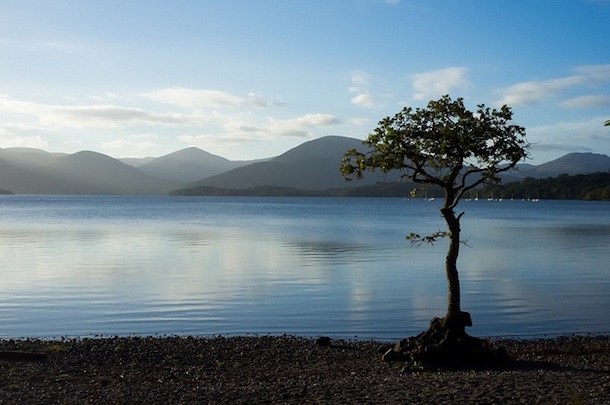
In one 2015 study, he and his colleagues randomly assigned 60 participants to a 50-minute walk in either a natural setting (oak woodlands) or an urban setting (along a four-lane road). Before and after the walk, the participants were assessed on their emotional state and on cognitive measures, such as how well they could perform tasks requiring short-term memory. Results showed that those who walked in nature experienced less anxiety, rumination (focused attention on negative aspects of oneself), and negative affect, as well as more positive emotions, in comparison to the urban walkers. They also improved their performance on the memory tasks.
In another study, he and his colleagues extended these findings by zeroing in on how walking in nature affects rumination—which has been associated with the onset of depression and anxiety—while also using fMRI technology to look at brain activity. Participants who took a 90-minute walk in either a natural setting or an urban setting had their brains scanned before and after their walks and were surveyed on self-reported rumination levels (as well as other psychological markers). The researchers controlled for many potential factors that might influence rumination or brain activity—for example, physical exertion levels as measured by heart rates and pulmonary functions.
Even so, participants who walked in a natural setting versus an urban setting reported decreased rumination after the walk, and they showed increased activity in the subgenual prefrontal cortex, an area of the brain whose deactivation is affiliated with depression and anxiety—a finding that suggests nature may have important impacts on mood.
Bratman believes results like these need to reach city planners and others whose policies impact our natural spaces. “Ecosystem services are being incorporated into decision making at all levels of public policy, land use planning, and urban design, and it’s very important to be sure to incorporate empirical findings from psychology into these decisions,” he says.
 Courtesy of Grand Canyon National Park
Courtesy of Grand Canyon National Park
Strayer is one of those researchers. He believes that being in nature restores depleted attention circuits, which can then help us be more open to creativity and problem-solving.
“When you use your cell phone to talk, text, shoot photos, or whatever else you can do with your cell phone, you’re tapping the prefrontal cortex and causing reductions in cognitive resources,” he says.
In a 2012 study, he and his colleagues showed that hikers on a four-day backpacking trip could solve significantly more puzzles requiring creativity when compared to a control group of people waiting to take the same hike—in fact, 47 percent more. Although other factors may account for his results—for example, the exercise or the camaraderie of being out together—prior studies have suggested that nature itself may play an important role. One in Psychological Science found that the impact of nature on attention restoration is what accounted for improved scores on cognitive tests for the study participants.
This phenomenon may be due to differences in brain activation when viewing natural scenes versus more built-up scenes—even for those who normally live in an urban environment. In a recent study conducted by Peter Aspinall at Heriot-Watt University, Edinburgh, and colleagues, participants who had their brains monitored continuously using mobile electroencephalogram (EEG) while they walked through an urban green space had brain EEG readings indicating lower frustration, engagement, and arousal, and higher meditation levels while in the green area, and higher engagement levels when moving out of the green area. This lower engagement and arousal may be what allows for attention restoration, encouraging a more open, meditative mindset.
It’s this kind of brain activity—sometimes referred to as “the brain default network”—that is tied to creative thinking, says Strayer. He is currently repeating his earlier 2012 study with a new group of hikers and recording their EEG activity and salivary cortisol levels before, during, and after a three-day hike. Early analyses of EEG readings support the theory that hiking in nature seems to rest people’s attention networks and to engage their default networks.
Strayer and colleagues are also specifically looking at the effects of technology by monitoring people’s EEG readings while they walk in an arboretum, either while talking on their cell phone or not. So far, they’ve found that participants with cell phones appear to have EEG readings consistent with attention overload, and can recall only half as many details of the arboretum they just passed through, compared to those who were not on a cell phone.
Though Strayer’s findings are preliminary, they are consistent with other people’s findings on the importance of nature to attention restoration and creativity.
“If you’ve been using your brain to multitask—as most of us do most of the day—and then you set that aside and go on a walk, without all of the gadgets, you’ve let the prefrontal cortex recover,” says Strayer. “And that’s when we see these bursts in creativity, problem-solving, and feelings of well-being.”
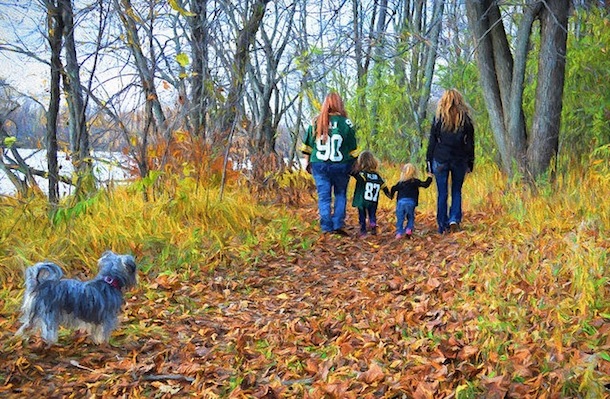
In a series of experiments published in 2014, Juyoung Lee, GGSC director Dacher Keltner, and other researchers at the University of California, Berkeley, studied the potential impact of nature on the willingness to be generous, trusting, and helpful toward others, while considering what factors might influence that relationship.
As part of their study, the researchers exposed participants to more or less subjectively beautiful nature scenes (whose beauty levels were rated independently) and then observed how participants behaved playing two economics games—the Dictator Game and the Trust Game—that measure generosity and trust, respectively.
After being exposed to the more beautiful nature scenes, participants acted more generously and more trusting in the games than those who saw less beautiful scenes, and the effects appeared to be due to corresponding increases in positive emotion.
In another part of the study, the researchers asked people to fill out a survey about their emotions while sitting at a table where more or less beautiful plants were placed. Afterwards, the participants were told that the experiment was over and they could leave, but that if they wanted to they could volunteer to make paper cranes for a relief effort program in Japan. The number of cranes they made (or didn’t make) was used as a measure of their “prosociality” or willingness to help.
Results showed that the presence of more beautiful plants significantly increased the number of cranes made by participants, and that this increase was, again, mediated by positive emotion elicited by natural beauty. The researchers concluded that experiencing the beauty of nature increases positive emotion—perhaps by inspiring awe, a feeling akin to wonder, with the sense of being part of something bigger than oneself—which then leads to prosocial behaviors.
Support for this theory comes from an experiment conducted by Paul Piff of the University of California, Irvine, and colleagues, in which participants staring up a grove of very tall trees for as little as one minute experienced measurable increases in awe, and demonstrated more helpful behavior and approached moral dilemmas more ethically, than participants who spent the same amount of time looking up at a high building.
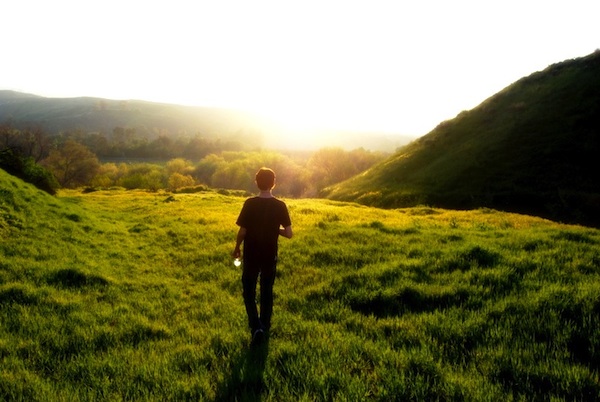
No one knows if there is an ideal amount of nature exposure, though Strayer says that longtime backpackers suggest a minimum of three days to really unplug from our everyday lives. Nor can anyone say for sure how nature compares to other forms of stress relief or attention restoration, such as sleep or meditation. Both Strayer and Bratman say we need a lot more careful research to tease out these effects before we come to any definitive conclusions.
Still, the research does suggest there’s something about nature that keeps us psychologically healthy, and that’s good to know…especially since nature is a resource that’s free and that many of us can access by just walking outside our door. Results like these should encourage us as a society to consider more carefully how we preserve our wilderness spaces and our urban parks.
And while the research may not be conclusive, Strayer is optimistic that science will eventually catch up to what people like me have intuited all along—that there’s something about nature that renews us, allowing us to feel better, to think better, and to deepen our understanding of ourselves and others.
“You can’t have centuries of people writing about this and not have something going on,” says Strayer. “If you are constantly on a device or in front of a screen, you’re missing out on something that’s pretty spectacular: the real world.”

But, even though I’ve always believed that hiking in nature had many psychological benefits, I’ve never had much science to back me up…until now, that is. Scientists are beginning to find evidence that being in nature has a profound impact on our brains and our behavior, helping us to reduce anxiety, brooding, and stress, and increase our attention capacity, creativity, and our ability to connect with other people.
“People have been discussing their profound experiences in nature for the last several 100 years—from Thoreau to John Muir to many other writers,” says researcher David Strayer, of the University of Utah. “Now we are seeing changes in the brain and changes in the body that suggest we are physically and mentally more healthy when we are interacting with nature.”
While he and other scientists may believe nature benefits our well-being, we live in a society where people spend more and more time indoors and online—especially children. Findings on how nature improves our brains brings added legitimacy to the call for preserving natural spaces—both urban and wild—and for spending more time in nature in order to lead healthier, happier, and more creative lives.
Here are some of the ways that science is showing how being in nature affects our brains and bodies.
1. Being in nature decreases stress
It’s clear that hiking—and any physical activity—can reduce stress and anxiety. But, there’s something about being in nature that may augment those impacts.In one recent experiment conducted in Japan, participants were assigned to walk either in a forest or in an urban center (taking walks of equal length and difficulty) while having their heart rate variability, heart rate, and blood pressure measured. The participants also filled out questionnaires about their moods, stress levels, and other psychological measures.
Results showed that those who walked in forests had significantly lower heart rates and higher heart rate variability (indicating more relaxation and less stress), and reported better moods and less anxiety, than those who walked in urban settings. The researchers concluded that there’s something about being in nature that had a beneficial effect on stress reduction, above and beyond what exercise alone might have produced.
In another study, researchers in Finland found that urban dwellers who strolled for as little as 20 minutes through an urban park or woodland reported significantly more stress relief than those who strolled in a city center.
The reasons for this effect are unclear; but scientists believe that we evolved to be more relaxed in natural spaces. In a now-classic laboratory experiment by Roger Ulrich of Texas A&M University and colleagues, participants who first viewed a stress-inducing movie, and were then exposed to color/sound videotapes depicting natural scenes, showed much quicker, more complete recovery from stress than those who’d been exposed to videos of urban settings.
These studies and others provide evidence that being in natural spaces— or even just looking out of a window onto a natural scene—somehow soothes us and relieves stress.

2. Nature makes you happier and less brooding
I’ve always found that hiking in nature makes me feel happier, and of course decreased stress may be a big part of the reason why. But, Gregory Bratman, of Stanford University, has found evidence that nature may impact our mood in other ways, too.In one 2015 study, he and his colleagues randomly assigned 60 participants to a 50-minute walk in either a natural setting (oak woodlands) or an urban setting (along a four-lane road). Before and after the walk, the participants were assessed on their emotional state and on cognitive measures, such as how well they could perform tasks requiring short-term memory. Results showed that those who walked in nature experienced less anxiety, rumination (focused attention on negative aspects of oneself), and negative affect, as well as more positive emotions, in comparison to the urban walkers. They also improved their performance on the memory tasks.
In another study, he and his colleagues extended these findings by zeroing in on how walking in nature affects rumination—which has been associated with the onset of depression and anxiety—while also using fMRI technology to look at brain activity. Participants who took a 90-minute walk in either a natural setting or an urban setting had their brains scanned before and after their walks and were surveyed on self-reported rumination levels (as well as other psychological markers). The researchers controlled for many potential factors that might influence rumination or brain activity—for example, physical exertion levels as measured by heart rates and pulmonary functions.
Even so, participants who walked in a natural setting versus an urban setting reported decreased rumination after the walk, and they showed increased activity in the subgenual prefrontal cortex, an area of the brain whose deactivation is affiliated with depression and anxiety—a finding that suggests nature may have important impacts on mood.
Bratman believes results like these need to reach city planners and others whose policies impact our natural spaces. “Ecosystem services are being incorporated into decision making at all levels of public policy, land use planning, and urban design, and it’s very important to be sure to incorporate empirical findings from psychology into these decisions,” he says.
 Courtesy of Grand Canyon National Park
Courtesy of Grand Canyon National Park3. Nature relieves attention fatigue and increases creativity.
Today, we live with ubiquitous technology designed to constantly pull for our attention. But many scientists believe our brains were not made for this kind of information bombardment, and that it can lead to mental fatigue, overwhelm, and burnout, requiring “attention restoration” to get back to a normal, healthy state.Strayer is one of those researchers. He believes that being in nature restores depleted attention circuits, which can then help us be more open to creativity and problem-solving.
“When you use your cell phone to talk, text, shoot photos, or whatever else you can do with your cell phone, you’re tapping the prefrontal cortex and causing reductions in cognitive resources,” he says.
In a 2012 study, he and his colleagues showed that hikers on a four-day backpacking trip could solve significantly more puzzles requiring creativity when compared to a control group of people waiting to take the same hike—in fact, 47 percent more. Although other factors may account for his results—for example, the exercise or the camaraderie of being out together—prior studies have suggested that nature itself may play an important role. One in Psychological Science found that the impact of nature on attention restoration is what accounted for improved scores on cognitive tests for the study participants.
This phenomenon may be due to differences in brain activation when viewing natural scenes versus more built-up scenes—even for those who normally live in an urban environment. In a recent study conducted by Peter Aspinall at Heriot-Watt University, Edinburgh, and colleagues, participants who had their brains monitored continuously using mobile electroencephalogram (EEG) while they walked through an urban green space had brain EEG readings indicating lower frustration, engagement, and arousal, and higher meditation levels while in the green area, and higher engagement levels when moving out of the green area. This lower engagement and arousal may be what allows for attention restoration, encouraging a more open, meditative mindset.
It’s this kind of brain activity—sometimes referred to as “the brain default network”—that is tied to creative thinking, says Strayer. He is currently repeating his earlier 2012 study with a new group of hikers and recording their EEG activity and salivary cortisol levels before, during, and after a three-day hike. Early analyses of EEG readings support the theory that hiking in nature seems to rest people’s attention networks and to engage their default networks.
Strayer and colleagues are also specifically looking at the effects of technology by monitoring people’s EEG readings while they walk in an arboretum, either while talking on their cell phone or not. So far, they’ve found that participants with cell phones appear to have EEG readings consistent with attention overload, and can recall only half as many details of the arboretum they just passed through, compared to those who were not on a cell phone.
Though Strayer’s findings are preliminary, they are consistent with other people’s findings on the importance of nature to attention restoration and creativity.
“If you’ve been using your brain to multitask—as most of us do most of the day—and then you set that aside and go on a walk, without all of the gadgets, you’ve let the prefrontal cortex recover,” says Strayer. “And that’s when we see these bursts in creativity, problem-solving, and feelings of well-being.”

4. Nature may help you to be kind and generous
Whenever I go to places like Yosemite or the Big Sur Coast of California, I seem to return to my home life ready to be more kind and generous to those around me—just ask my husband and kids! Now some new studies may shed light on why that is.In a series of experiments published in 2014, Juyoung Lee, GGSC director Dacher Keltner, and other researchers at the University of California, Berkeley, studied the potential impact of nature on the willingness to be generous, trusting, and helpful toward others, while considering what factors might influence that relationship.
As part of their study, the researchers exposed participants to more or less subjectively beautiful nature scenes (whose beauty levels were rated independently) and then observed how participants behaved playing two economics games—the Dictator Game and the Trust Game—that measure generosity and trust, respectively.
After being exposed to the more beautiful nature scenes, participants acted more generously and more trusting in the games than those who saw less beautiful scenes, and the effects appeared to be due to corresponding increases in positive emotion.
In another part of the study, the researchers asked people to fill out a survey about their emotions while sitting at a table where more or less beautiful plants were placed. Afterwards, the participants were told that the experiment was over and they could leave, but that if they wanted to they could volunteer to make paper cranes for a relief effort program in Japan. The number of cranes they made (or didn’t make) was used as a measure of their “prosociality” or willingness to help.
Results showed that the presence of more beautiful plants significantly increased the number of cranes made by participants, and that this increase was, again, mediated by positive emotion elicited by natural beauty. The researchers concluded that experiencing the beauty of nature increases positive emotion—perhaps by inspiring awe, a feeling akin to wonder, with the sense of being part of something bigger than oneself—which then leads to prosocial behaviors.
Support for this theory comes from an experiment conducted by Paul Piff of the University of California, Irvine, and colleagues, in which participants staring up a grove of very tall trees for as little as one minute experienced measurable increases in awe, and demonstrated more helpful behavior and approached moral dilemmas more ethically, than participants who spent the same amount of time looking up at a high building.

5. Nature makes you “feel more alive”
With all of these benefits to being out in nature, it’s probably no surprise that something about nature makes us feel more alive and vital. Being outdoors gives us energy, makes us happier, helps us to relieve the everyday stresses of our overscheduled lives, opens the door to creativity, and helps us to be kind to others.No one knows if there is an ideal amount of nature exposure, though Strayer says that longtime backpackers suggest a minimum of three days to really unplug from our everyday lives. Nor can anyone say for sure how nature compares to other forms of stress relief or attention restoration, such as sleep or meditation. Both Strayer and Bratman say we need a lot more careful research to tease out these effects before we come to any definitive conclusions.
Still, the research does suggest there’s something about nature that keeps us psychologically healthy, and that’s good to know…especially since nature is a resource that’s free and that many of us can access by just walking outside our door. Results like these should encourage us as a society to consider more carefully how we preserve our wilderness spaces and our urban parks.
And while the research may not be conclusive, Strayer is optimistic that science will eventually catch up to what people like me have intuited all along—that there’s something about nature that renews us, allowing us to feel better, to think better, and to deepen our understanding of ourselves and others.
“You can’t have centuries of people writing about this and not have something going on,” says Strayer. “If you are constantly on a device or in front of a screen, you’re missing out on something that’s pretty spectacular: the real world.”
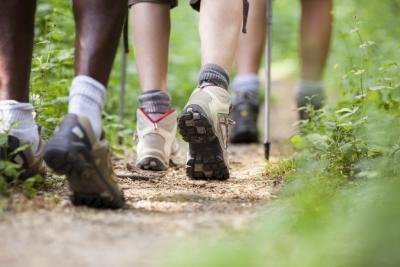
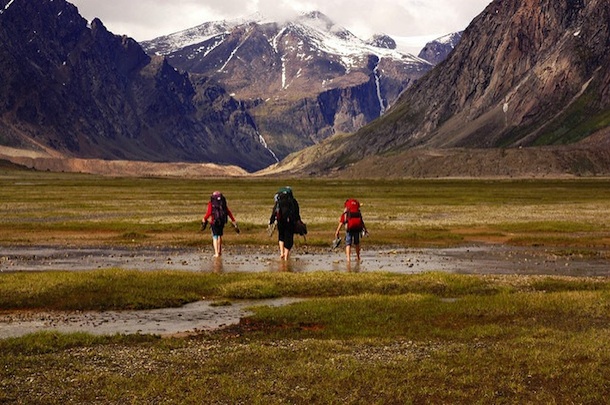

No comments:
Post a Comment